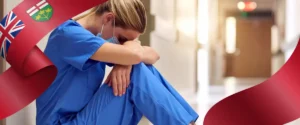Personal Support Workers (PSWs) play a vital role in monitoring and maintaining the health and safety of older adults. Because PSWs provide direct, daily care, they are often the first to notice subtle changes in a client’s condition.
Recognizing and promptly reporting early signs of respiratory distress, dehydration, and infection can prevent serious complications and even save lives. This article outlines key indicators, risk factors, and appropriate PSW actions in these common clinical situations.
1. Recognizing Respiratory Distress:
Respiratory problems such as pneumonia, COPD flare-ups, asthma, and influenza are common among seniors—particularly during the fall and winter months. Age-related changes in lung function and a weakened immune system increase the risk of respiratory distress, which can escalate quickly if not addressed.
Early Signs to Watch For
- Changes in breathing pattern – faster, slower, or laboured breathing
- Shortness of breath – even with minimal activity or while resting
- Noisy breathing – wheezing, gurgling, or rattling sounds
- Bluish lips or fingertips (cyanosis) – a sign of low oxygen
- Persistent coughing – dry or productive (with sputum)
- Anxiety or confusion – may indicate low oxygen levels
- Fatigue or weakness – more pronounced than usual
PSW Responsibilities
- Stay calm and reassure the client.
- Observe and document the onset, frequency, and severity of symptoms.
- Report immediately to the supervising nurse or healthcare professional.
- Ensure the client’s airway is clear and position them upright to ease breathing.
- Never administer oxygen or medication unless authorized by a nurse or care plan.
2. Identifying Dehydration:
Seniors are at higher risk of dehydration due to reduced thirst sensation, medication effects (e.g., diuretics), and mobility challenges. In cold months, people often drink less water, assuming they need fewer fluids than in summer—this misconception can lead to serious health issues such as confusion, low blood pressure, and urinary tract infections.
Early Signs to Watch For
- Dry mouth, lips, or tongue
- Decreased urine output or darker urine
- Constipation or hard stools
- Headache or dizziness
- Lethargy or irritability
- Sunken eyes or dry skin
- Sudden confusion or disorientation
PSW Responsibilities
- Encourage regular fluid intake, offering small sips frequently (unless fluid restriction is ordered).
- Monitor and record fluid intake/output as directed in the care plan.
- Offer hydration-rich foods such as soups, fruit, and gelatin if drinking is difficult.
- Report any signs of dehydration, confusion, or poor oral intake to the nurse promptly.
3. Detecting Early Signs of Infection:
Infections—especially respiratory, urinary tract, and skin infections—can progress rapidly in seniors and may present with atypical symptoms. Unlike younger adults, older clients may not develop a fever even with a serious infection. Instead, changes in behavior or function often appear first.
Early Signs to Watch For
- Sudden confusion or delirium
- Increased fatigue or weakness
- New or worsening pain (e.g., burning on urination, sore throat)
- Changes in temperature – fever or unusually low temperature
- Changes in skin – redness, swelling, warmth, or discharge at wound sites
- Cough, congestion, or shortness of breath
- Loss of appetite or nausea
PSW Responsibilities
- Conduct routine observations of appearance, behavior, and function.
- Document and communicate any new or unusual symptoms immediately.
- Follow infection prevention and control (IPAC) practices:
- Proper hand hygiene
- Use of personal protective equipment (PPE)
- Cleaning and disinfecting high-touch surfaces
- Support the client’s comfort, rest, and hydration while awaiting further assessment.
The Importance of Observation and Communication:
Observation is a core PSW skill. Small details—such as increased tiredness, changes in breathing, or reduced appetite—can provide early warning of serious illness. Effective communication ensures these observations lead to timely intervention.
Best Practices
- Document objectively: describe what you see, hear, or measure (avoid assumptions).
- Use clear language when reporting to nurses or supervisors (e.g., “Client’s breathing became rapid, 28 breaths per minute, and lips appeared bluish”).
- Follow the care plan and report immediately any deviation from the client’s usual baseline.

Conclusion:
PSWs are the eyes and ears of the healthcare team. Identifying and responding to early signs of respiratory distress, dehydration, and infection is a critical part of providing high-quality, person-centered care. Through vigilant observation, prompt reporting, and adherence to infection control and safety practices, PSWs help prevent hospitalizations, promote recovery, and protect the well-being of the seniors they serve.
Frequently Asked Questions (FAQs)
1. What are the respiratory symptoms of dehydration?
Dehydration can cause rapid, shallow breathing (tachypnea) as the body tries to compensate for reduced blood volume and oxygen delivery. In severe cases, it may also cause shortness of breath or dryness of the airways, leading to coughing or a dry throat. However, these are usually secondary to fluid loss and low blood pressure rather than primary lung problems.
2. When to go to the hospital for dehydration in adults?
Go to the hospital if you or someone else experiences severe signs of dehydration, including:
- Dizziness, confusion, or fainting
- Rapid heartbeat or breathing
- Inability to keep fluids down (vomiting)
- Very little or no urine for 8+ hours
- Sunken eyes or very dry mouth and tongue
- Low blood pressure or feeling extremely weak
These symptoms may indicate moderate to severe dehydration that needs intravenous (IV) fluids and medical monitoring.
3. What can be mistaken for dehydration?
Several conditions share symptoms with dehydration, such as:
- Heat exhaustion or heat stroke
- Low blood sugar (hypoglycemia)
- Low blood pressure (hypotension)
- Infections, especially urinary tract or respiratory infections
- Electrolyte imbalances
- Anemia or heart problems (which can also cause fatigue, dizziness, and weakness)
4. What diseases cause dehydration in adults?
Common causes include:
- Diabetes mellitus and diabetes insipidus (excessive urination)
- Gastrointestinal diseases (vomiting, diarrhea, gastroenteritis)
- Kidney disease (impaired water balance)
- Adrenal insufficiency (Addison’s disease)
- Severe infections or fever
- Heat-related illnesses and burns (loss of fluids through skin)
5. What is the most common infection in the elderly?
The urinary tract infection (UTI) is the most common infection among older adults. It often presents atypically — with confusion, weakness, or falls — rather than the classic symptoms of pain or burning during urination.
6. What are early sepsis symptoms in seniors?
Early signs of sepsis in older adults may be subtle and differ from younger people. Look for:
- Confusion or sudden change in mental status (often the first sign)
- Fever or abnormally low temperature
- Rapid breathing or heart rate
- Weakness or lethargy
- Decreased urine output
- Low blood pressure or fainting
Because seniors may not show typical infection symptoms, any sudden decline in alertness or physical function should be treated as a possible warning sign of sepsis and evaluated urgently.





